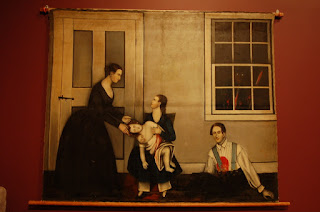DIVINE REFORMATION
“Of his [James Freeman’s] brothers and sisters two only survive, and one of the has for twelve years past been a wandering lunatic; one of those that died, a sister, was, for many years immediately preceding her death, insane.” -The Report of the trial of William Freeman
I don’t know how crazy my family was, but I can’t deny how good they had it in America. Yet, there’s a little of each of these characters (related or not) in all of us. An old friend and I laughed about the trend in ancestry.com circles to concentrate on sketchy relationships to distant royalty, or celebrity. We wondered why nobody ever talked about being related to drunken janitors, insane junkies, or petty thieves. We had our share of all those, but for the most part, neither royalty nor celebrity, my family was just too inconsequential to be noticed. They seemed to like it that way. Most still do.
My maternal grandfather Raymond Van Kleck (Van Vliet) Jennings, was a hard working, small town railroad man, who I never knew. He died in his 50’s, (in 1955) while I was very young and my grandmother who never remarried, became the matriarch of our clan. She was born Mary Ethel “Babe” Cole in Coldenham, New York in 1898. Married to Raymond Jennings at 16, living into three centuries, Babe Jennings rode in horse drawn farm wagons as a young girl, experienced 9/11 and the internet, before she died at my sister’s house at the age of 105. As Roland Barthes puts it, “…either we code it [family] as a group of immediate allegiances or else we make it into a knot of conflicts and repressions. As if our experts cannot conceive that there are families “whose members love one another.” Ours was of the loving variety. We still have each other’s backs.
When her husband died so young my grandmother went to work. For years she worked as the “cafeteria lady” in the old Montgomery Academy and in later years enjoyed her well-earned retirement living with her sister Aunt Emma, downriver in Walden. In 1969 my parents invited her to move in with us and live out the rest of her life among her grandchildren; dying peacefully in our home. She was already 71. How long could she last?
Unlike Phoebe Jennings Teed, almost thirty years later, at the age of 99, Mary Ethel Jennings had outlived all her children (but my mother and her now obsolete pacemaker) becoming the oldest person on record to have one of those tiny heart-pumping machines successfully replaced. The surgeons were so proud of their work, they called The Hartford Courant. UPI picked up the story. If you google Mary Ethel Jennings’ pacemaker, the facts of my grandmother's operation will be revealed. If you google Jack Hodges, Austin Reed or William Freeman it will be a very different story.
On February 26, 1829, Jack Hodges, model prisoner was fully pardoned from Auburn State Penitentiary by the man who made his career convicting him, then New York Governor Martin Van Buren. Austin Reed and William Freeman were six years old. By the time Jack was pardoned, the young attorney Henry Seward and Jack Hodges had lived within blocks of each other for over four years. At least some of Seward’s clients were likely confined at Auburn State Prison. Henry Seward would have known many of the Auburn Prison agents like Elam Lyndes, Gershom Powers, and Ulysses F. Doubleday. Agents Powers and Doubleday both became Congressmen from New York’s 24th District. More importantly, upon his release, Jack was no longer the anathema he was in Sugar Loaf, but a changed man, a public symbol of what could be accomplished by the progressive Auburn System. Jack Hodges was the well known “reformed man.” Did anyone in Auburn Prison make the connection between Hodges (the murderer of the farmer downstate) and William Henry Seward, the nephew of the murdered farmer? There’s no record of any interaction between Jack and Henry. Auburn Prison officials circulated a legislative document describing Jack Hodges as “a remarkable convict, and there can be little hazard calling his a case of clear and decided reformation.” Everyone hoped Jack wouldn’t prove them wrong.
Every dark corner I crept around, following these breadcrumbs, eventually led back to Jack Hodges. This man who shot my great….uncle, survived five years in Newgate and about the same amount of time at Auburn, could not be shaken. Hodges came out of prison to a waiting job and place to live, courtesy of Rev. Dr. William Wisner and Rev. Ansel Eddy. According to surviving records, the seminary dormitory keeper, Mr. Ten Eyck, “…had the use of the Seminary lands, three cows, a horse and cart, the kitchen and hall and the furniture of the same.” Due to misuse the previous year, Mr. Ten Eyck had lost the provision for the horse and cart privileges. He’d have to manage without.
This was Jack’s break from a rough shod, murderous, past helping Mr. Ten Eyck (and possibly William Freeman) chop wood and repair things around the seminary. For a moment, putting aside the doubt and cynicism that the religious tract chronicling of Jack Hodges (public figure) breeds, we can entertain the thought that maybe Jack Hodges was converted, at peace, redeemed, reformed and at one with his chosen God; as he worked on the broken seminary furniture, moving things across the grounds….. sadly without the use of horse or cart.

Comments
Post a Comment